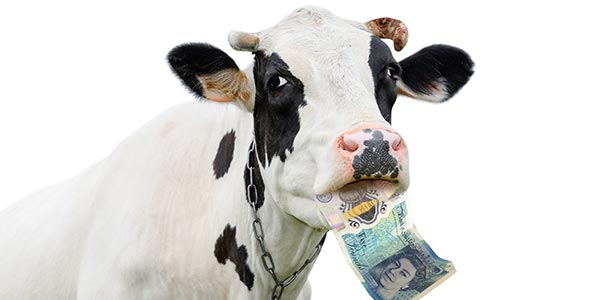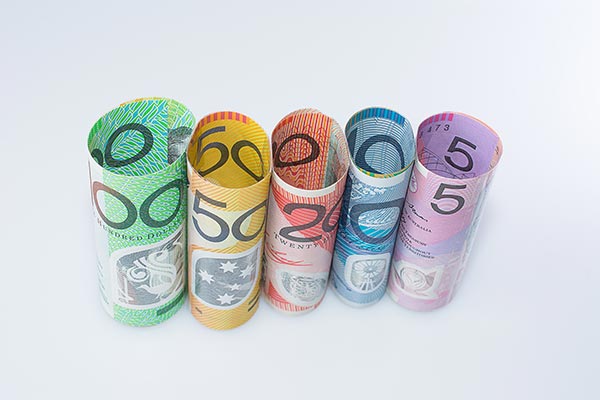
By Charles Morgan and Hubert Walker for CoinWeek ….
Tallow: The white nearly tasteless solid rendered fat of cattle and sheep used chiefly in soap, candles, and lubricants.
Tallow. Probably not a word we or any other numismatic authors and journalists have to use much, but it’s at the heart of the latest carfuffle coming out of England’s introduction of the new £5 polymer note back in September.
And we thought the fivers’ tendency to stick to each other was a big deal…
Well, it still is, sort of, but we’ll get to that.
Here’s what’s happened.
Tweet, Tweet
What did we ever do without Twitter?
Over the last decade, Twitter has turned into the go-to social media platform for the underdog with something to say. No one with a Twitter account is beholden to any kind of professional gatekeeper of opinion – just ask Donald Trump, whose tweets render the mainstream media feckless and push his agenda out to the masses without critical interpretation.
On Sunday, November 27, a vegan activist and businesswoman from the UK named Steffi Rox tweeted at the Bank of England to ask if the new polymer £5 note featuring Sir Winston Churchill, which was introduced into circulation on September 13, 2016, contained tallow. As noted above, tallow is processed animal fat, usually beef, mutton and pork[1]. It is often found in soap, candles, and other such products.

Twitter user @SteffiRox’s initial tweet to the Bank of England
Much to its credit, the Bank of England responded to Ms. Rox’s tweet the next day:

@SteffiRox’s retweet of the Bank of England’s response confirming the use of tallow in the manufacture of the new polymer £5 note[2].
The Internet subsequently responded, with vegans and progressives in England and around the world taking to social media to protest. Enough outraged emails had already been forwarded by November 28 that debunking website Snopes.com felt compelled to chime in. Hindu leaders in the UK expressed their concern, even banning the note from temple donation coffers.
Shortly after the Bank’s admission, a 47-year-old hotel worker from Keswick in Cumbria named Doug Maw started a petition on Change.org insisting that the Bank stop using animal products on the cash that millions of people–which many, such as Hindus, Jains and Sikhs, object to on moral and religious grounds–must use on a daily basis. More than 1,000 people signed his petition within the first hour, and more than 70,000 people had signed by November 29. At the time of publication, 129,753 signatures had been collected.
Maw intends to deliver the petition in person to the Bank of England on Tuesday, December 6.
The Bank has so far offered no comment on the Change.org petition. It did, however, release a statement on November 30 addressing the general uproar:
We are aware of some people’s concerns about traces of tallow in our new five pound note. We respect those concerns and are treating them with the utmost seriousness.
This issue has only just come to light, and the Bank did not know about it when the contract was signed.
Information recently provided by our supplier, Innovia, and its supply chain shows that an extremely small amount of tallow is used in an early stage of the production process of polymer pellets, which are then used to create the base substrate for the five-pound note.
Innovia is now working intensively with its supply chain and will keep the Bank informed on progress towards potential solutions.
Please note that not one but TWO bucks were passed in the brief statement above.
Innovia
The corporate history of banknote producer Innovia Films is complicated yet probably no different than that of a hundred other firms like it. Suffice it to say that before it became known as Innovia in 2004, the Cumbria-based manufacturer of polymer films for packaging, wrapping and other industrial uses has its roots in several continental chemical companies going back to the 1920s.
In the 1970s and ’80s, the Reserve Bank of Australia (RBA) funded research into banknote security. The RBA worked with Australia’s Commonwealth Scientific and Industrial Research Organization (CSIRO) and the University of Melbourne to find practical anti-counterfeiting measures for the country’s paper currency. Australia had decimalized its monetary system in 1966, and a massive counterfeiting operation had been discovered before the next year was out.
The result of these efforts was the world’s first polymer note (the Australian $10), issued in 1988. Innovia Films teamed up with the RBA in 1996 and continues to produce 80 denominations of banknotes for 24 different countries.
As the Bank of England had already clarified on November 30, one of Innovia’s suppliers is responsible for the use of tallow in the new fiver’s production. Patricia Potts, a spokesman for Innovia Films, later confirmed this, claiming on behalf of the company that Innovia would never “knowingly add any animal ingredients into our products.” The supplier, whom she refused to name, employs a trace amount of processed animal fat as an anti-static tool[3] but is actively looking for an affordable substitute.
Which is more or less the crux of the matter: cost.
The Pros and Cons of Polymer
Polymer bills are cleaner and more hygienic than paper and cotton-based notes. They are more durable, too, and last longer in circulation (about five years for a plastic note as opposed to the approximately two-year lifespan of a paper bill). In addition, certain security features aren’t possible without the use of a polymer substrate. All of these differences add up to direct and indirect savings for the economy, making plastic notes an attractive proposition for monetary authorities around the world.
Of course, there are trade-offs. Plastic banknotes can shrink or melt when exposed to temperatures above 120 degrees Celsius (248 degrees Fahrenheit), and the notes do sometimes stick together thanks to static electricity. This last problem is a serious issue, since businesses and consumers may inadvertently lose money when paying for purchases or giving change.
This is why anti-static measures–such as the controversial use of tallow–are taken in the first place.
But is there an acceptable alternative?
The key ingredient in tallow is stearic acid, a common natural fatty acid. It is found mostly in the adipose tissue of animals, but it is also found in coconuts and the nut of the shea tree. The only issue is whether it can be extracted from such vegetable sources in quantities great enough and at costs low enough to match the scale of polymer banknote production.
As it is, the Bank of England has no firm plans to eliminate the use of tallow from its banknote production process, though the Bank does say that it is working on the matter. Unfortunately, it appears that any changes to the supply chain will not take place in time to prevent either the upcoming polymer £10 or £20 notes from containing animal fat. The new £10 note will feature Jane Austen on the front and is set for release in 2017; the new £20 note, featuring the prescient English painter J. M. W. Turner, is scheduled for release in 2020.
Even petition creator Doug Maw is pragmatic about what the Bank can and cannot do. While he is hopeful that all animal products will be removed from future bills, he doesn’t expect anything to happen to the notes already in circulation.
Your Mileage May Vary
Various world banks have been forced by the outcry on social media to make their own pronouncements of guilt or innocence. Innovia supplies substrate to the following 24 countries; all of them are affected by the controversy. Dates to the right of the country’s name signify when polymer notes were first adopted:
- Australia – 1988
- Brunei – 1996
- Canada – 2011
- Chile – 2004
- Costa Rica – 2011
- Dominican Republic – 2010
- Guatemala – 2007
- Honduras – 2010
- Hong Kong – 2007
- Malaysia – 1998
- Mauritania – 2014
- Mauritius – 2013
- Mexico – 2002
- Mozambique – 2011
- New Zealand – 1999
- Nicaragua – 2009
- Nigeria – 2007
- Papua New Guinea – 1991
- Paraguay – 2009
- Romania – 1999
- Singapore – 1991
- United Kingdom* – 2016
- Vanuatu – 2010
- Vietnam – 2001
*Scotland, even though it is part of the United Kingdom, issues its own polymer notes and therefore is not affected.
The Reserve Bank of Australia has been forthright about the animal content in its banknotes, as has the Bank of Canada. In contrast, the Reserve Bank of New Zealand has made no comment, instead referring all inquiries to Innovia.
Amanda Sorrenson of the Vegan Society of New Zealand said that the reality of animal-based products in the nation’s cash supply was an unpleasant discovery. “What, are vegans going to use coins?” she said. “I don’t think it particularly pleases anybody to know that there’s animal fat in your wallet.”
She also said that the issue didn’t rise to the level of protest on the Vegan Society’s part.
“You’ve got to put up a guard about achieving perfection… You can’t bend over backwards and become a very strange person in your endeavor.”
At any rate, different people have different takes on the situation.
Simon Round, a spokesman for the Board of Deputies of British Jews, told the British Broadcasting Corporation (BBC) that “Jews are not allowed to consume tallow but are permitted to handle it.”
Mike Rigby, a member of the Manchester Vegan and Vegetarian Group, claims that he had broached the same question as Steffi Rox, only six weeks earlier.
“Given the years of consultation, research and development that went into this, I’m amazed that no affected groups, such as muslims or vegans, have piped up until now, when it’s far too late to do anything about it,” Rigby said. “Even if they switched the production tomorrow we’d be in the ridiculous situation of looking for certain ‘safe’ serial numbers to see which we were ‘allowed’.”
And chemical engineering professor David Solomon, the man who started the CSIRO research group at the University of Melbourne that lead to the creation of the world’s first polymer note in 1988, has called the protest “stupid”.
“There’s trivial amounts of it in there,” Professor Solomon said in an interview with 2GB radio. He goes on to point out the various benefits of polymer notes, including the fact that they don’t pick up drug residue and that fewer trees are chopped down in the process.
The problem, however, should not be dismissed lightly. If a distinctive new five-pound note sans tallow is produced and circulates alongside the “old” version, what happens when businesses refuse to accept one or the other? Will people troll the legal system by suing vegan business owners who refuse to accept legal tender? Will the UK alter the term’s very definition? Will exchanging “tallow notes” for vegan-friendly bills become an annoying yet necessary chore for those who insist on living by their principles?
By the way, paper £5 notes are still legal tender until May 5, 2017.
* * *
Notes
[1] Specifically, the fat located near the kidneys or from the loins.
[2] Screen grab, December 5, 2016.
[3] Vice.com did a diverting bit of math to sketch out a very rough estimate of how many cows might be used to produce one £5 note…
Sources
https://www.change.org/p/bank-of-england-remove-tallow-from-bank-notes
http://www.snopes.com/beef-tallow-in-new-5-notes/
http://www.bbc.com/news/business-38144598
http://money.cnn.com/2016/11/29/news/pound-animal-fat-money-in-notes-bills/
http://uproxx.com/life/five-pound-note-animal-fat/
http://www.bankofengland.co.uk/publications/Pages/news/2016/085.aspx
http://www.bbc.com/news/business-38164921
http://www.csmonitor.com/World/Europe/2016/1130/Is-your-money-made-from-animal-fat
http://gizmodo.com/24-countries-where-the-money-contains-meat-1789514317
http://indiatoday.intoday.in/story/england-five-pound-note-vegans-animal-fat/1/823107.html
https://inews.co.uk/essentials/lifestyle/money/scotlands-new-plastic-5-notes-suitable-vegetarians/
http://www.9news.com.au/national/2016/12/02/12/28/polymer-pioneer-says-uk-protest-stupid






For those who are following this particular controversy, here is the complete text of a press release from the Universal Society of Hinduism, dated Jan. 25, 2019:
Hindus urge Reserve Bank of New Zealand to come up with beef-free banknotes
Hindus are urging Reserve Bank of New Zealand (RBNZ) to produce beef-free banknotes in the future.
Hindus worldwide are upset over RBNZ continuing with polymer banknotes which reportedly contained traces of tallow (rendered form of beef or mutton fat).
Hindu statesman Rajan Zed, in a statement in Nevada (USA) today, urged RBNZ to show respect to the feelings of Hindus and come up with a banknote production process which did not use beef as an ingredient.
Zed, who is President of Universal Society of Hinduism, indicated that it was highly insensitive on the part of RBNZ to continue with reportedly beef-laced banknotes.
Rajan Zed urged RBNZ Governor Adrian Orr and Finance Minister Grant Robertson to seriously look into this issue and New Zealand Prime Minister Jacinda Ardern to intervene.
Consumption of beef is highly conflicting to Hindu beliefs and it is certainly banned from entering Hindu religious centers. Cow, the seat of many deities, is sacred and has long been venerated in Hinduism, Zed states.
Most of the large companies world over did extensive consumer research before launching a new product. RBNZ should have been wise and literate enough to look into the religious sensitivities of its consumers before investing so much money and effort into the production of polymer banknotes, Rajan Zed pointed out.
RBNZ should re-read and follow its own professed “Value” of “inclusion”, Zed added.
RBNZ, established in 1934 and headquartered in Wellington, is New Zealand’s central bank wholly owned by the government of New Zealand and supplies New Zealand banknotes.
* * *